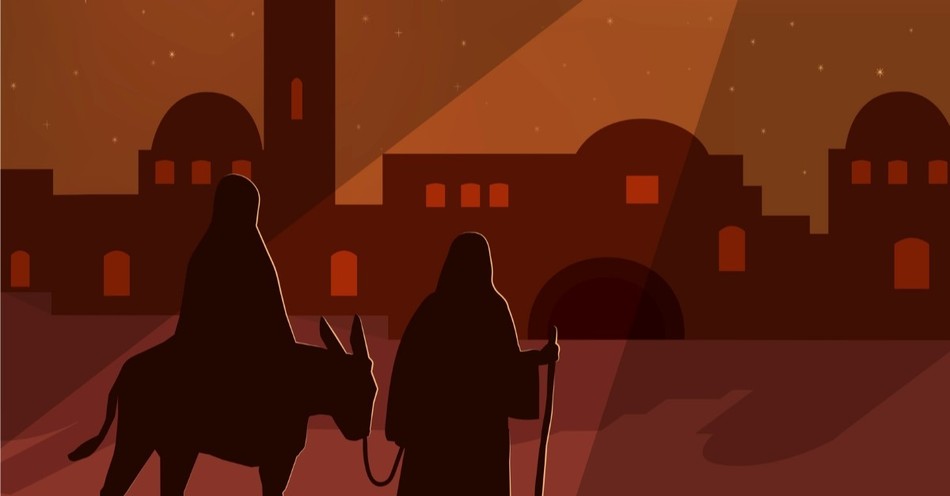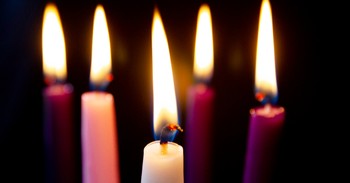The traditional Christmas image features Mary, Joseph, and baby Jesus under a roughshod manger’s eaves. My family’s living room manger had sheep in various poses and moss on the stable roof. My husband’s family called their large manger a “crib,” and it was handmade by their grandfather from branches of old Christmas trees. Their church had a life-size manger in the sanctuary, with a recently born baby posing as newborn Jesus. I don’t recall farm animals in their church’s manger, but I have been to several outdoor, live nativities with a donkey, sheep, and cow.
It is always dark and quiet at a manger scene—a backdrop for Christmas carols such as “Away in a Manger” and “Silent Night.” Humble and beautiful images of Christ’s birth in a manger, when he was turned away from the Inn at Bethlehem, are a meaningful part of the Christmas holiday.
But does this representation accurately depict what really went on at Christmas?
Which Gospel Mentions an Inn at Bethlehem?
The Gospel of Luke describes Christmas in Bethlehem, a small town in the Palestinian West Bank. In Luke 2:4-8, the Gospel author writes:
“So Joseph also went up from the town of Nazareth in Galilee to Judea, to Bethlehem the town of David, because he belonged to the house and line of David. He went there to register with Mary, who was pledged to be married to him and was expecting a child. While they were there, the time came for the baby to be born, and she gave birth to her firstborn, a son. She wrapped him in cloths and placed him in a manger, because there was no guest room available for them.”
In the Gospel of Matthew, the narrative of Christ’s birth is told from Joseph’s point of view, and the time setting is before and after Christ’s birth. There is no intimate manger scene in Matthew, as in Luke. Matthew’s readers have Joseph’s genealogy, showing he is descended from King David (Matthew 1:1-17). In Matthew 1:18-25, the narrative tells of Joseph’s dream foretelling Jesus’ birth as the promised Savior and Joseph’s noble response, attending to a pregnant fiancée.
In Matthew 2, Jesus is already born. The chapter opens with three wise men who have traveled from afar, telling King Herod a star is leading them to Christ’s birthplace. Herod feels threatened by the birth of Jesus, the prophesied king of the Jews, and plots to use information from the wise men to destroy Jesus. After the wise men travel on to Bethlehem and worship and give gifts to the baby Jesus, they bypass Jerusalem and Herod on their return trip, warned by a dream that Herod wants to kill Jesus.
Both the wise men and Joseph have dreams warning them to stay away from King Herod, who defends his reign as king by having all children under the age of two killed. Jesus’ young parents flee to Egypt with their baby, where they remain until after Herod’s death. At the end of Matthew 2, Joseph, Mary, and Jesus have relocated to Nazareth.
Scholars across the theological spectrum have given different opinions on the accuracy of the Gospel narratives. While conservative scholars maintain the events happened as the text reports, that doesn’t mean our popular image of the Christmas story hasn’t developed over the centuries. Kenneth Bailey argues in his book Jesus through Middle Eastern Eyes that Christians have embellished Luke 2’s details over the past two thousand years. The rude innkeeper who turned away Mary and Joseph and the wise men’s camels sharing the manger with sheep and a cow have been added to Christmas lore and manger scenes.
So, do we know if they really stayed at an inn in Bethlehem?
Do We Know If Mary and Joseph Really Stayed at an Inn in Bethlehem?
Though Christians often assume that the manger of Luke 2:7 was a livestock stable because an inn had no room, looking at the original biblical language suggests we may be missing something.
The Gospels were written in Greek rather than the disciples’ first language of Aramaic because Greek was the established first-century Roman Empire’s established language, and Gospel writers wanted to spread the Gospel. Andy Mickelson explains that the Greek word used for the place Jesus was born, καταλύματι, translates into English as “inn,” “guest room” or “lodging.” In other Greco-Roman writings, κατάλυμα refers to a temporary place for guests or travelers to stay.
Many Old Testament verses use the word κατάλυμα to refer to a travelers’ shelter. The word κατάλυμα is used in Exodus 4:24 to tell where Moses and his family stay when they travel from Midian to Egypt. A nondescript κατάλυμα houses the travelers, whether it is a building or simply a tent or natural shelter such as a cave in the wilderness.
Since the same word κατάλυμα is used in the original Gospel text of Luke to describe where there was no room for Mary and Joseph, it’s possible that means they stayed in the inn’s livestock stable instead of the inn’s living quarters.
However, Mickelson notes that when the New Testament uses κατάλυμα, it usually means a different kind of “guest room” than we typically imagine. Instead of a commercial hotel, it would more likely be a guest room in a private house. For example, it’s the word used when Jesus asks for a guest room to hold the last supper with his disciples.
What Kind of Inn Would Mary and Joseph Have Stayed at in Bethlehem?
Given what Mickelson and other biblical scholars report, Mary and Joseph likely did not stay at a traveler’s inn. They probably stayed at a family home since Joseph’s family was from Bethlehem.
Middle Eastern families traditionally provided food and lodging for guests. We see this costume reflected in how often Jesus, the disciples, and Paul were welcomed into acquaintances’ homes during their travels. Also, a poor and pregnant couple like Mary and Joseph would most likely have asked to lodge with relatives and not a costly traveler’s inn upon their arrival in Bethlehem. Considering the Roman census was in full swing with many visitors in town, and Mary and Joseph would have traveled slowly since Mary was pregnant, his relatives might have already given the guest room to other relatives in town for the census. Since there was “no room at the inn,” they likely stayed in a downstairs room that housed animals.
First-century Jewish family houses had a large room on the main floor where the family ate, slept, and lounged. Down some steps at the end of the home was a space for the family’s livestock. Donkeys and cows ate from a feeding trough carved into the family room floor. The downstairs animals had free access to their food trough in the family living room. Sheep kept in the family home had a smaller trough—portable for outside use or placed similarly in the family space—although sheep were also often kept in public pens or fields.
Who Came to See Jesus After He Was Born in Bethlehem?
In Luke 2, the young parents’ first visitors are exuberant shepherds invited to Jesus’ birth by a host of angels. When the angels announce Jesus’ glorious birth, the shepherds “watching their flocks by night” hurry to Bethlehem. The Gospel of Luke doesn’t give many details about how the visit went. It is emphasized that when the shepherds left, they rushed away to tell everyone they met about Christ’s miraculous birth. This suggests they were in a crowded city, which sounds right for Bethlehem at the time of the census.
In Matthew’s account of Christ’s birth, the first visitors we read about are three wise men who have traveled on a long journey to see the newborn king (Matthew 1:1). This detail and the detail stating King Herod killed all babies under the age of two—to eliminate Jesus’ threat to Herod’s throne—suggest it has been several years since Jesus was born. The wise men take a long time traveling from distant countries before seeing Jesus, while the seemingly close-by shepherds in Luke 2 scurry to Bethlehem the instant angels announce Jesus’ birth.
Does It Matter Whether Mary and Joseph Stayed at a Traveler’s Inn in Bethlehem?
The exact details of Jesus’ birth are not as important as the fact that He arrived to save a sinful, troubled world. The Christmas narrative goes deeper than merely presenting specific details.
Some takeaways from the story of Christ’s birth include the following: pregnant Mary and Joseph are obedient to God and their government, leaving town for the census right before Jesus is born to the unmarried couple. When they arrive in Bethlehem, the young, pregnant couple may have experienced that “left out” feeling—or maybe they calmly accepted that there was no room for them as guests in a relative’s home and they had to sleep in animal quarters. This foreshadows the way Jesus was rejected many times in his adult life. His humble birth reflects the humility Christ demonstrated and taught His disciples and us to emulate.
The best message from Christ’s birth story is that there are still travelers ecstatic to meet Jesus. By whatever means, Jesus still creeps into our lives. He is reborn in our hearts each Christmas. It is a joyful, holy night that fulfills God’s promise of a Savior of His people.
Photo Credit: © Getty Images/gldcreations

This article is part of our larger Christmas and Advent resource library centered around the events leading up to the birth of Jesus Christ. We hope these articles help you understand the meaning and story behind important Christian holidays and dates and encourage you as you take time to reflect on all that God has done for us through His Son, Jesus Christ!
What Is Advent: Meaning, History, and Traditions
Advent Prayers for Friends, Family, and More
What Is an Advent Wreath and How to Use One?
The History of Santa Claus: Origin of St. Nicholas
Christmas Bible Verses & Scripture Story
What is Christmas? True Meaning and Holiday History
Christmas Eve History and Traditions
Why Gold, Frankincense, and Myrrh?
When Was Jesus Born? Why December 25th
Where Was Jesus Born?



